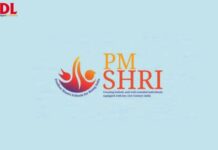BITS is synonymous with quality technical education in the country. It has many firsts to its credit, be it integrationof technology in its examination system, strong industry-academia linkage, or innovation in academics to suit
 the global technological advances. BITS provides three-tiered education in the fields of engineering, technology, economics, management, and pharmacy with an aim to leverage critical manpower gaps across industries. Digital Learning caught up with BITS Pilani Vice Chancellor Prof L K Maheshwari to discuss what makes BITS stand out in the field of technical education.
the global technological advances. BITS provides three-tiered education in the fields of engineering, technology, economics, management, and pharmacy with an aim to leverage critical manpower gaps across industries. Digital Learning caught up with BITS Pilani Vice Chancellor Prof L K Maheshwari to discuss what makes BITS stand out in the field of technical education.
What position does technical education occupy in India’s higher education sector?
There is a great need for technical education in a country like India, especially as far as trained manpower is concerned. The role of technical eduction is to create an integrated personality who not only has a good grasp of his/her subject but is also equipped with ommunication skills, computer skills, inter-personal skills, management skills, etc. These skills are of utmost importance in this era of globalisation, particularly in dealing with cultures of other countries. What is important is to have a broad-based curriculum in technical education, integrating science, engineering, and technology skills. This will place eople from these vocations in greater demand. This is what the experience of BITS has shown. e have been practising this over the last 35 years and you can find BITS alumni every where in the world.
What ICT initiatives have been taken by BITS Pilani in rendering an effective teaching-learning atmsophere?
BITS has the reputation of pioneering the online examinations for admissions through the path breaking integration of BITSAT. In this process, over a lakh students take the admission
test, which is available over a period of 35 days. Under BITSAT, students have the freedom to chose the city, day and even the time of test in the online mode. The scores obtained in each segment is made available instantly at the end of each session. Unlike other institutions like IIT’s, even the counselling of our students efore admission is done online at our campuses. All he information is ccessible online and our registration process is also completely digital. Another novel project from BITS is Embryo, which fosters collaboration between BITS academics, researchers, alumni and students through lectures, research projects, and xposure to current research trends around the world. The aim of the project is to make vailable the rich pool of academic and industry experience to BITS students by leveraging the Internet and video conferencing technologies so as to enable alumni anywhere in the orld to deliver live interactive online lectures to students. at BITS Pilani. Almost hundred lectures have been delivered till now in different subjects through this project. We also run raining programmes for employed professionals working in areas of engineering, anufacturing, pharmaceuticals, micro-electronics, etc through blended learning approach. BITS has also conceived and designed the BITS Virtual University (VU) offering multimedia ourse to enable people who are off-campus to avail of the facilities offered to a normal on-campus student registered under the same programme. The advantage of this concept of U is that students can get a degree from BITS, while being off-campus. Since these courses are web-enabled, the student can work in his own comfortable environment at his own pace nd is not restricted to the classroom. BITS has always been on the forefront as far as linkages with industry is concerned. Please share some examples. Our partnerships with the industry go back a long way to 1970’s. According to the latest estimates, we have collaborations with round 154 companies such as Wipro, Patni Computers, Tech Mahindra, Bharat Forge Ltd, oston Analytics, General Motors, Motorola, Morgan Stanley, Symantec, TATA, etc, through which they provide training as well as scholarships to our students. Wipro runs a four-year rogramme called WASE, through which our BSc students are trained at Wipro campuses in hennai, Pune, Bangalore, Hydrabad, Kolkata, etc. We also have a concept called Practice chools, which is a structured programme involving student and faculty participation in the ndustry to deal with real-life problems. The Practice School (PS) method of education is a ontrolled simulation of real life and creates the circumstance whereby the university is linked with the world of work. The curriculum through PS finds a formal method of bringing he reality of the world of work into the educational process. In short, as a part of the total rogramme, it takes the classroom for a period of 7.5 months to a professional location where he students and the faculty get involved in real-life problems. Credits obtained by the student at the station form a part of his total credit towards his degree. BITS-industry artnership also extends beyond curriculum to social initiatives. BITS Pilani campus runs a BPO in collaboration with a local business group where we train the local educated youth in BPO jobs like medical transcription, etc. So far we have succeeded in providing employment o 60 rural youths trained in this BPO and are hopeful of scaling it to 1000 jobs.
What was the dea behind setting up of NEN?
National Entrepreneurship Network (NEN) is a non-profit venture of the Wadhwani oundation involving five premier academic institutions in India, namely BITS Pilani, IIT ombay, IIM Ahmedabad, SP Jain Institute, Bombay and IBAB, Bangalore. Under NEN, we ave set up a Centre for Entrepreneurial Leadership and also conducted a number of orkshops o develop entrepreneurial leadership as well as facilitate entrepreneurial activities among our graduate engineers. As part of NEN, we have recently set up a ele-medicine project in a nearby village. Our Goa campus has developed a number of information systems through mobiles called Avishkar Project. Through this, the rural people an get information on various subjects related to agriculture, education, health, governance, tc. << Embryo is a novel project which fosters collaboration between BITS academics, researchers, alumni and students through lectures, research projects, and exposure to current research trends around the world The Practice School (PS) method of education is a controlled simulation of real life and creates the circumstance whereby the university is inked with the world of work






















